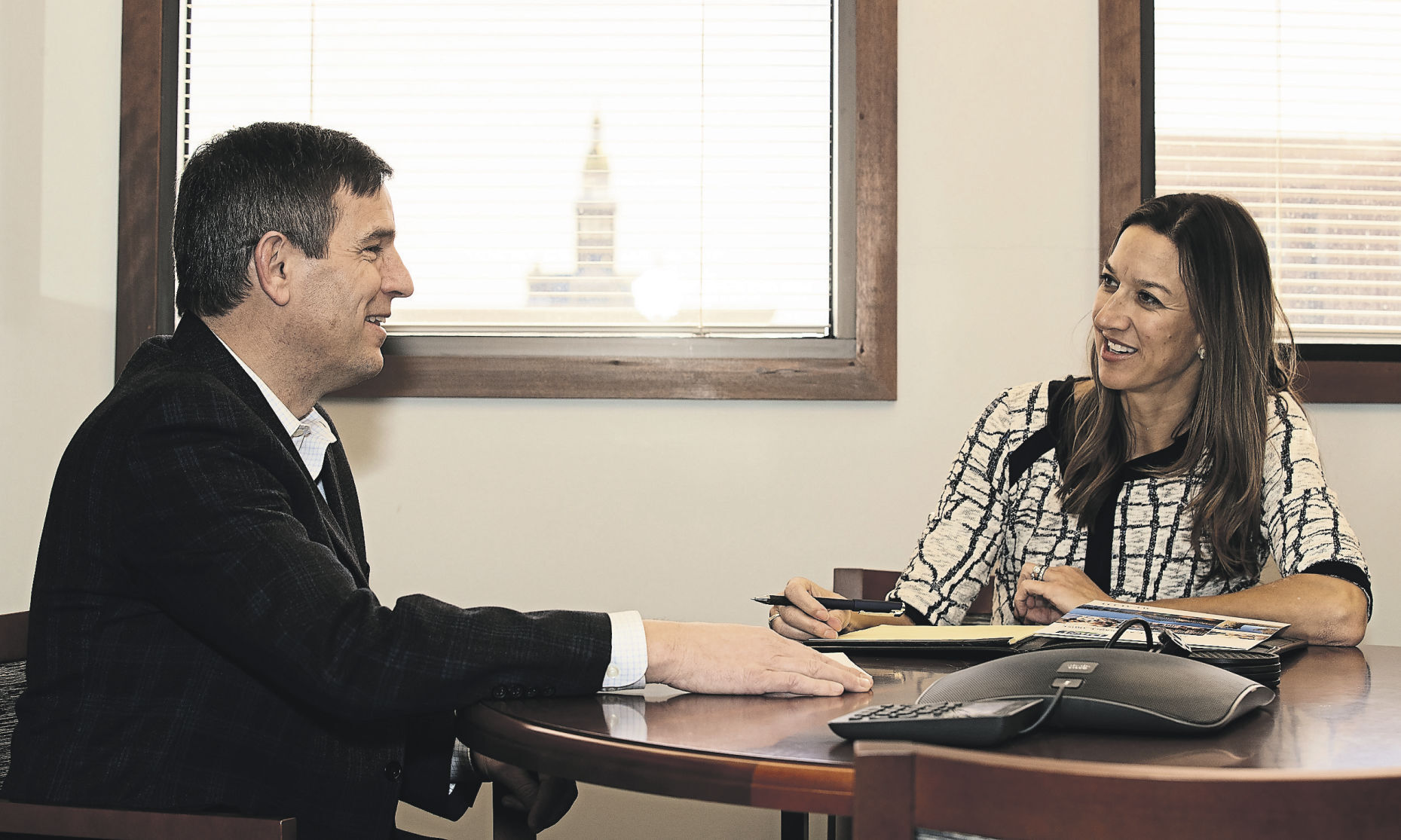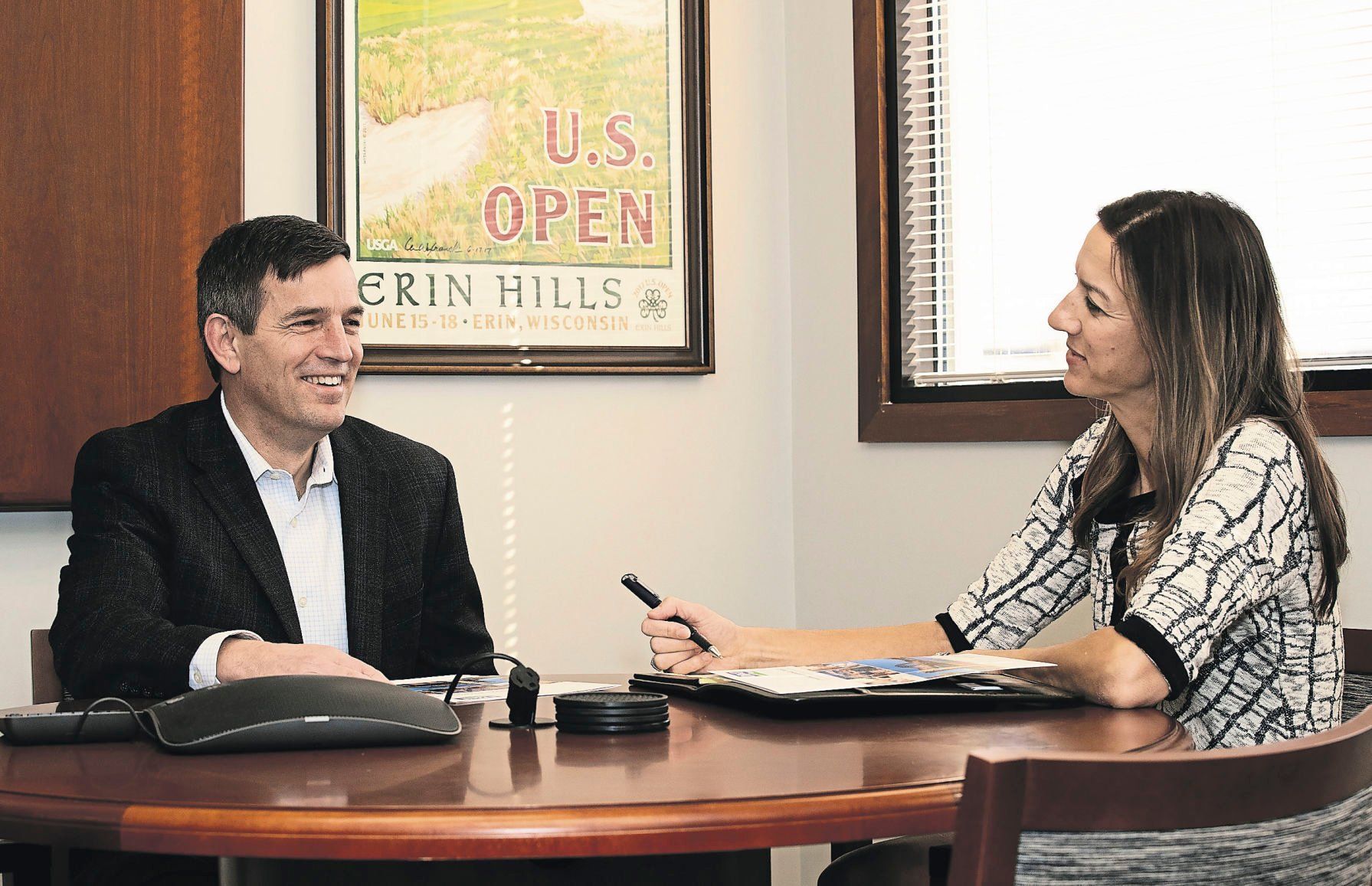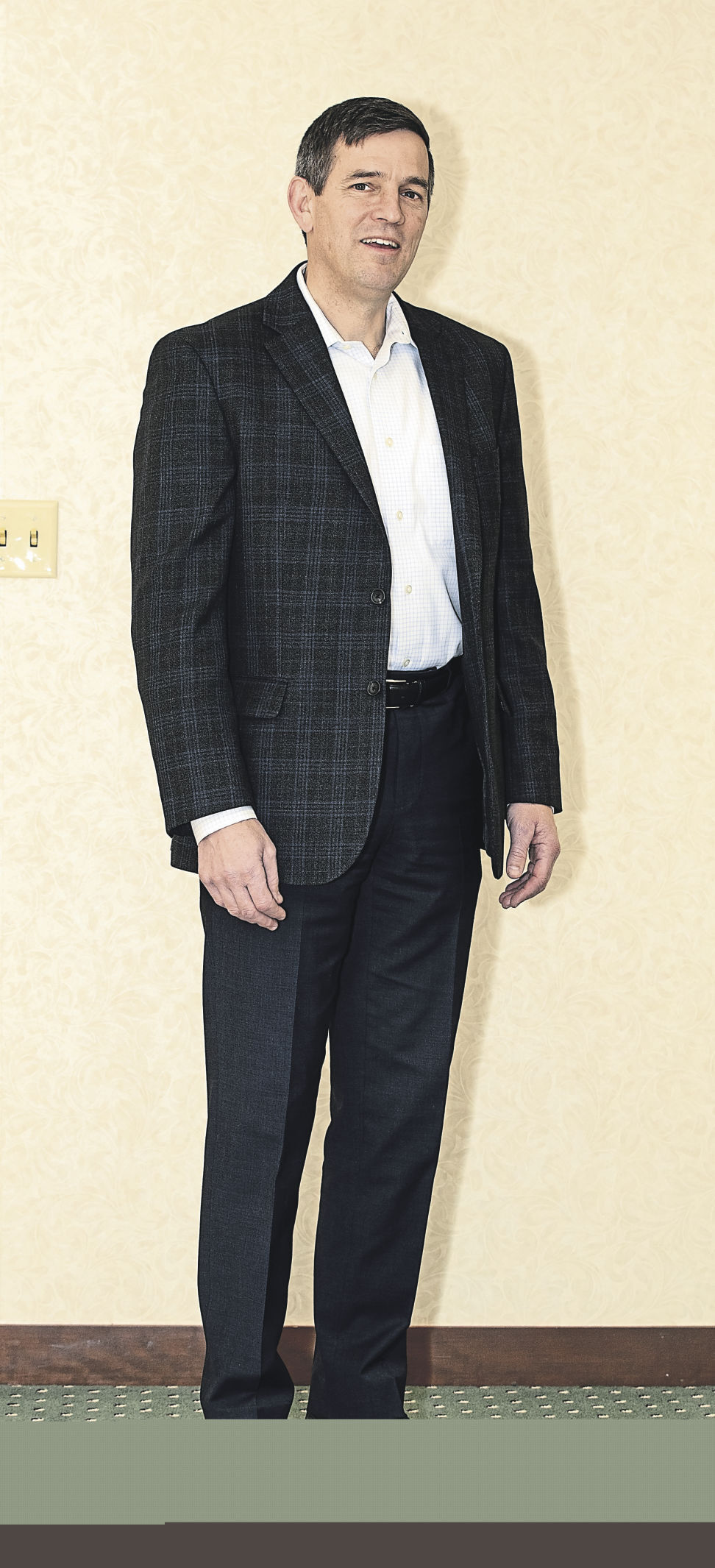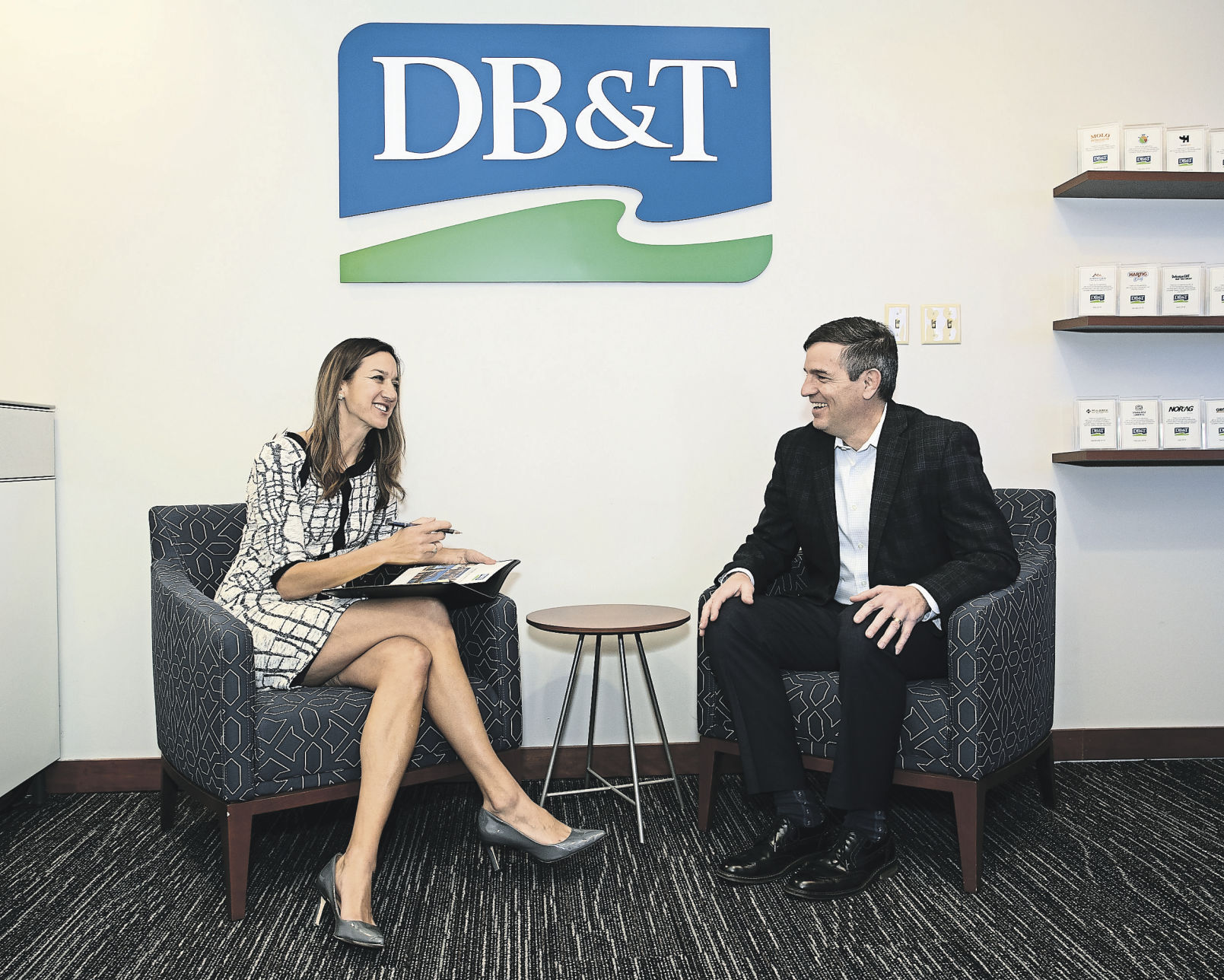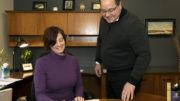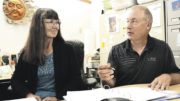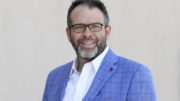Eric Foy, Business Development Manager, Vice President
Retirement Plan Services, HTLF and Dubuque Bank and Trust
Eric Foy has been married to Kim for almost 25 years. They met at the University of Northern Iowa. Kim teaches second grade at Kennedy Elementary School in Dubuque. They have three daughters (Allie, Sophia and Lydia). Allie teaches second grade at her former elementary, Bryant Elementary School. Sophia is a junior at the University of Iowa majoring in psychology with minors in human relations and lifestyle medicine. Lydia is a junior at Wahlert Catholic High School.
Foy and his wife enjoy following their kids’ activities, walking and hiking, and family vacations. They sponsor young couples preparing to be married in their parish. Foy also has served the Hills and Dales’ mission for more than 20 years. Recently, he joined the Opening Doors Board of Directors.
Formerly a runner, Foy now likes to ride his bike as weather permits. You also will find him working in their yard as much as possible. Additionally, he follows the Iowa Hawkeyes, especially the football and wrestling programs. The Minnesota Vikings, Minnesota Twins and his high school athletic programs continue to be interests.
For the past 22-plus years, Foy has worked for Dubuque Bank and Trust, HTLF and HTLF Retirement Plan Services in a variety of business development roles. He is business development manager for HTLF Retirement Plan Services. In addition to managing three business development officers located in Minneapolis, Denver and Phoenix, he works directly with the bankers, customers and prospects of Dubuque Bank and Trust and Illinois Bank and Trust.
Prior to joining the HTLF organization, he worked for Sister Catherine Dunn and Clarke University.
Can you name a person who has had a tremendous impact on you as a leader?
Yes, I can name many individuals who have impacted my leadership style: Joan Poe, owner of Standard Distributing, Waterloo, Iowa, taught me that it is important to identify the strengths of your team members and encourage them to leverage those qualities. John Foley, director of admissions at Clarke University, demonstrated the importance of shutting your door so you can listen and validate the opinions of your staff. Dave Wick, investment services director at HTLF Investment Services, stressed the importance of having a weekly process that focuses on the activities necessary to achieve success. John Schmidt, former president of Dubuque Bank and Trust, current DB&T and HTLF board member, and CFO of A.Y. McDonald Industries, demonstrated the importance of taking time to get to know everyone on your team. Bob Sanger, West Hancock High School football coach for more than 50 years, taught me the importance of believing in yourself and sharing that belief with your teammates.
The individual that impacted me the most as a person and a leader is my grandfather. He taught me to treat everyone with dignity and respect. He demonstrated how to be a problem-solver and to be resourceful. He demonstrated the importance of humility and humor in building relationships. He valued the opinions of experts, but he would stand up and be heard when he felt his voice was needed. He was appreciative of support, even when it might be considered insignificant or expected. He believed that you need to celebrate accomplishments. He was genuine.
What are the most important decisions you make as a leader of your organization?
The most important decisions that I make as a leader center around personnel decisions. In particular, hiring decisions are the most difficult and the most important decisions that I make as a leader. It is critical to find the right skill set with the right personality to meet the expectations of the position and to fit into the culture of the organization.
Working in a matrix environment, I bring many constituents into the hiring decision process. This includes “dotted line” managers, department leaders and support staff. I want to hear the perspectives of many team members before making these important decisions. By including many individuals in the process, we have improved the results of the hiring process.
As a producing manager, I also have to decide how best to allocate my time. And, I have to determine what information my manager needs to be informed and make decisions.
As an organization gets larger, there can be a tendency for the “institution” to dampen the “inspiration.” How do you keep this from happening? The best way to keep the “institution” from dampening the “inspiration” is to embrace the “institution.” As we have experienced significant growth at HTLF, it has become evident that, as a leader, I need to use the talents and energy of my team, as well as my own, to achieve institutional goals.
Straying too far in a direction that is not aligned with the institution is unproductive. Therefore, I try to secure the input of my team members to collaborate toward the achievement of institutional goals, which allows these individuals to still have a “seat at the table” and be able to use their talents and energy.
Which is more important to your organization — mission, core values or vision? All are important. However, mission makes the strongest connection to me. I want to work for an organization with a mission that aligns with my personal beliefs. The mission needs to be real and genuine, not simply words on paper.
At HTLF, our mission statement is, “Enriching lives, one customer, employee and community at a time.” This mission statement resonates with me. Taking care of our customers and their employees is important to me and my team. I take pride in delivering quality retirement plan solutions that benefit the many companies and nonprofit organizations that we support, and their employees.
It is comforting to know that I work for an employer that values its employees. And, it is rewarding to work for an employer that understands the importance of giving back to the community with time, talent and treasure. I was really proud of the way that DB&T and HTLF stepped forward during the height of the COVID-19 crisis to support the communities where we do business. Additionally, I am grateful that my employer allows me the ability to support the missions of non-profit organizations like Hills & Dales and Opening Doors. They allow me the flexibility to support these organizations during work hours and they financially support their missions.
What is one characteristic that you believe every leader should possess? One characteristic that I feel is extremely important is a sincere interest in each individual on your team. The leaders that have made the biggest impact on me have taken an interest in me professionally and personally. They have taken time to know my strengths and my opportunities for growth. They know what motivates me. They have been truly interested in how I spend my time outside of work. They understand me, and I know they are working hard for my success. I aspire to be a similar leader.
What advice to you have for future leaders? A few bits of advice for future leaders would include the following:
- Put yourself in uncomfortable positions that allow you to grow.
- Trust your core values. Your parents, teachers, pastors, managers, friends and other influential individuals have gotten you this far. Trust that your values are applicable in your role as a leader.
- Find a mentor or two, and ask for some of their time regularly.
- Volunteer. You will cross paths with great leaders and individuals in these experiences.
- Swallow your pride, and open yourself up to what you can learn from other leaders.
What lessons can leaders take away from the current pandemic? The pandemic has taught us many different lessons. One of the most important lessons for me is to value opportunities and time. In my work, relationships are critical to achieving goals. As technical as retirement plan services can be, it is a relationship business. Time spent together has been the most productive way to build relationships for me.
Therefore, I have come to realize the importance of using each opportunity to spend with team members, partners, and leaders both inside and outside the organization. Once you have a strong relationship with someone, you can conduct business in a virtual environment.
What are two or three of the best things about being a leader?
Helping individuals on my team achieve their goals is the best thing about being a leader. It is very rewarding. This is followed closely by knowing that the contributions of my team were important to the success of the department, division and organization.


